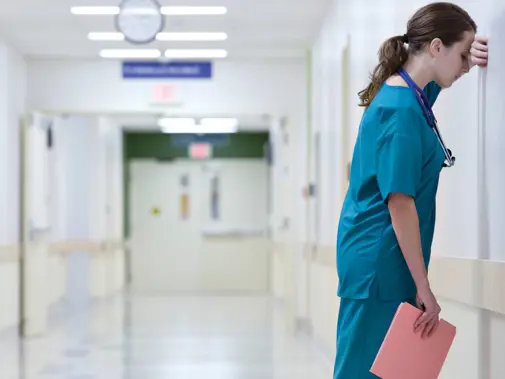There’s a leak coming from the ceiling of our ward office. Rather than Ben Wishaw bringing it to our attention by tripping over a bucket (as in the opening scenes of the BBC drama This is Going to Hurt), we have a student nurse wondering if we’ve noticed and whether we’ll do anything about it.
We can’t tell you about obstetrics and gynaecology and how close it is or isn’t to Adam Kay’s TV drama as we’re a different type of junior doctor. Specifically medical ones. Our patients include anyone in the hospital who’s over 18 and doesn’t require an operation (and some of those who do). We look after most diseases you’d care to name, including strokes, heart attacks and frailty. We’re called to most emergencies, and we’ve also looked after most patients hospitalised with COVID-19 over the past two years.
The underlying themes in This is Going to Hurt ring true: crumbling infrastructure, too few doctors, too many rota gaps, a paralysing fear of complaint, poor mental health leading to burnout and pressured relationships at home. We also possess a strong desire to put on a front and pretend the problems aren’t there. The NHS isn’t immune from society’s problems and so there’s racism (still), sexism (still) and homophobia (still), though things are improving compared to the early 2000s when Kay’s show was set.
Sometimes daily life in the NHS is laughable. There are computers on wheels, though they must remain plugged in at all times otherwise they turn off. We use bleeps (pagers), although Dr Kay’s didn’t go off enough. And people do place objects in their bodies in very inventive ways.
It’s uncomfortable to recognise some of Dr Kay’s faults as our own. We have all had shifts where we snapped at colleagues; not because they were doing anything wrong, but because they were asking for help; seen by ourselves as another problem in an endless sea of jobs. Often, it’s when we haven't had a break, food or used the toilet for ten hours. Amongst the storm, it’s all too easy to lose sight of supporting each other when we're struggling to stay afloat ourselves. The ubiquitous black humour and jokes exist because if we felt the pain of everyone we cared for all the time, we wouldn’t come back to work.
‘Firefighting’ – a term used in the drama – is the perfect analogy. The fire never goes out, but some days there are three of you fighting it, a computer system that works and the light of a day off on the horizon. Other days it’s just you and your stethoscope.
In stark contrast to the immaculately dressed consultants who glide into Adam’s labour ward, criticise his efforts and swiftly depart, we have ones who look like they’ve aged ten years over the last two. Notably, the car park isn’t brimming with their Aston Martins. Our bosses have a clear desire to make things better, but the follow through is sometimes lost under the immediate pressure to survive the winter crisis/ summer crisis/ current crisis. We're all knackered.
Then there's the untold side of becoming a doctor. We pay for our GMC registration, indemnity insurance and exams out of our own pocket; the exams for our first stage of training alone are nearly £1,500. This also assumes you pass all three of them first time, which is no mean feat when you're in your late twenties, often with a new family and revising around 12-hour shifts and 12 day stretches. European medical students are baffled: ‘What?! Don’t they want people to be doctors in the UK?!’
It’s easy to moan. It’s not all bad, we promise. Often, despite the system, amazing care is delivered, life-saving treatment is given, and people get better. The most miraculous thing that goes unnoticed on an NHS ward is that no-one has had to pay anything to be there. Patients can focus on getting better, not remortgaging their houses or borrowing money from family for hospital treatment. Our colleagues who trained or grew up abroad never stop being amazed by this.
Dr Kay's NHS working days ended 16 years ago. We’re pleased to say things have changed and continue to change. In Wales, the BMA is negotiating for a new contract with the aim of protecting our working hours more. Airline pilots' hours are limited because well-rested people make better and safer decisions under pressure. It's not rocket science to apply this to doctors.
It will always catch us off guard when something goes wrong, or someone dies suddenly. Logically, knowing you did all you could doesn't stop the internal nagging voice that picks over things at 3am. But we're getting better at talking about it. We have junior-led welfare groups, deanery counselling services and welfare resources. Some of us feel able to be open about using these services with our friends, but there's still a wariness around being seen to be ‘not cut out for the job’.
Finally, we all know people who have quit or, like Adam’s SHO Shruti, worse. We don’t always feel safe driving home after a night shift or walking onto a ward that might have a COVID outbreak if we’re ill and vulnerable ourselves. And while we don’t need people clapping our efforts every Thursday night, we don’t always feel seen, valued, or appreciated.
It shouldn't still hurt right?
Cat Bralesford and Ben Pyrke are internal medical trainees in South Wales
The BMA has free and confidential 24/7 counselling and peer support services, open to all doctors and medical students (regardless of BMA membership), plus their partners and dependents. Call 0330 123 1245. There is always someone you can talk to

